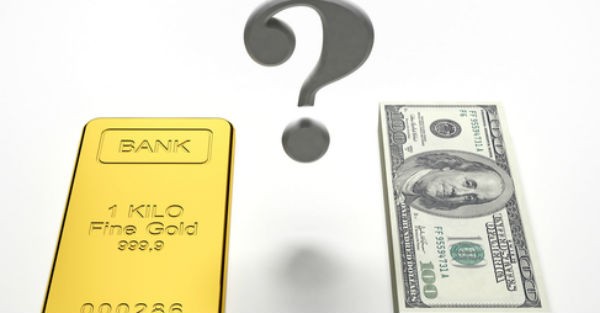
December 8, 2014
London, England
[Editor’s note: This letter was written by Tim Price, London-based wealth manager and editor of Price Value International.]
You can be for gold, or you can be for paper, but you cannot possibly be for both. It may soon be time to take a stand.
The arguments in favour of gold are well known. Yet they are widely ignored by the paperbugs, who have a curious belief system given that its end product (paper currency) is destined to fail. We just do not know precisely when.
The price of gold is weakly correlated to other prices in financial markets, as the last three years have clearly demonstrated.
Indeed gold may be the only asset whose price is being suppressed by the monetary authorities, as opposed to those sundry instruments whose prices are being just as artificially inflated to offer the illusion of health in the financial system (stocks and bonds being the primary financial victims).
Beware appearances in an unhinged financial system, because they can be dangerously deceptive.
It is quite easy to manipulate the paper price of gold on a financial futures exchange if you never have to make delivery of the physical asset and are content to play games with paper.
At some point that will change.
Contrary to popular belief, gold is supremely liquid, though its supply is not inexhaustible.
It is no-one’s liability – this aspect may be one of the most crucial in the months to come, as and when investors learn to start fearing counterparty risk all over again.
Gold offers a degree of protection against uncertainty. And unlike paper money, there are fundamental and finite limits to its creation and supply.
What protection? There is, of course, one argument against gold that seems to trump all others and blares loudly to skeptical ears.
Its price in US dollars has recently fallen. Not in rubles, and not perhaps in yen, of course, but certainly in US dollars.
Perhaps gold is really a currency, then, as opposed to a tiresome commodity? But the belief system of the paperbug dies hard.
The curious might ask why so many central banks are busily repatriating their gold? Or why so any Asian central banks are busily accumulating it?
It is surely not just, in Ben Bernanke’s weasel words, tradition?
If you plot the assets of central banks against the gold price, you see a more or less perfect fit going back at least to 2002.
It is almost as if gold were linked in some way to money. That correlative trend for some reason broke down in 2012 and has yet to re-emerge.
We think it will return, because 6,000 years of human history weigh heavily in its favour.
Or you can put your faith in paper. History, however, would not recommend it. Fiat money has a 100% failure rate.
Please note that we are not advocating gold to the exclusion of all else within the context of a balanced investment portfolio.
There is a role for objectively creditworthy debt, especially if deflation really does take hold – it’s just that the provision of objectively creditworthy bonds in a global debt bubble is now vanishingly small.
There is a role for listed businesses run by principled, decent management, where the market’s assessment of value for those businesses sits comfortably below those businesses’ intrinsic worth.
But you need to look far and wide for such opportunities, because six years of central and commercial banks playing games with paper have made many stock markets thoroughly unattractive to the discerning value investor.
We suggest looking in Asia.
As investors we are all trapped within a horrifying bubble. We must play the hand we’ve been dealt, however bad it is.
But there are now growing signs of end-of-bubble instability. The system does not appear remotely sound.
Since political vision in Europe, in particular, is clearly absent, the field has been left to central bankers to run amok.
The only question we cannot answer is: precisely when does the centre fail?
The correct response is to recall the words of the famed value investor Peter Cundill, when he confided in his diary:
“The most important attribute for success in value investing is patience, patience, and more patience. THE MAJORITY OF INVESTORS DO NOT POSSESS THIS CHARACTERISTIC.”
But the absence of patience by the majority of investors is fine, because it leaves more money on the table for the rest of us.
The only question remaining is: in what exact form should we hold that money?
Be patient. And consider the words of James Grant from his quietly passionate and wonderfully articulate Cato Institute speech:
“What will futurity make of the Ph.D. standard? Likely, it will be even more baffled than we are. Imagine trying to explain the present-day arrangements to your 20-something grandchild a couple of decades hence – after the Crash of, say, 2016, that wiped out the youngster’s inheritance and provoked a central bank response so heavy-handed as to shatter the confidence even of Wall Street in the Federal Reserve’s methods.
“I expect you’ll wind up saying something like this: “My generation gave former tenured economics professors discretionary authority to fabricate money and to fix interest rates. We put the cart of asset prices before the horse of enterprise. We entertained the fantasy that high asset prices made for prosperity, rather than the other way around. We actually worked to foster inflation, which we called ‘price stability’ (this was on the eve of the hyperinflation of 2017). We seem to have miscalculated.”
from SOVEREIGN MAN http://ift.tt/1wq3ChF
via IFTTT